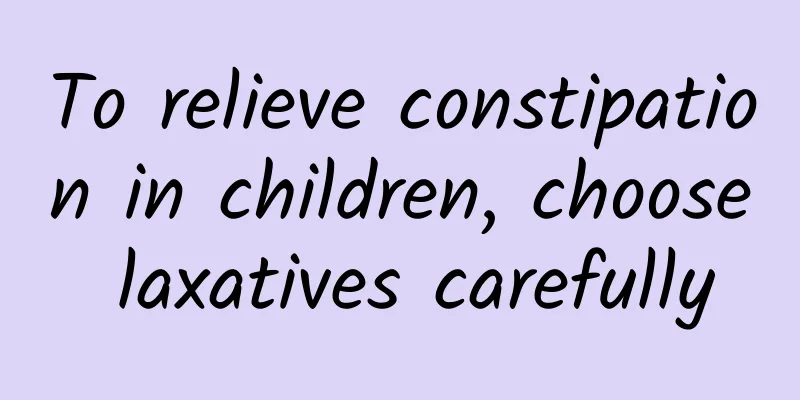To relieve constipation in children, choose laxatives carefully

|
Author: Liang Shuhong, The First Affiliated Hospital of Zhengzhou University Liu Yajuan, The First Hospital of Jilin University Reviewer: Zhao Jie, Chairman of the Chinese Medical Association Clinical Pharmacy Branch, The First Affiliated Hospital of Zhengzhou University Chief Pharmacist Professor Constipation, like diarrhea, is a common disease among children. When children lack fluids, fruits, vegetables or high-fiber cereals, they will have dry stools due to insufficient solid water in their stools, leading to constipation. Some children resist defecation because they have felt pain during defecation before, which makes the stool hard and more painful. You must be very anxious when you see a child with a red face, groaning and a painful expression. Don't worry too much. The child's digestive function is still relatively weak. You can prevent and relieve the child's constipation through dietary conditioning, moderate exercise, keeping a happy mood, and reasonable use of medication. Figure 1 Copyright image, no permission to reprint How to determine if a child is constipated? Constipation is a common symptom of digestive system diseases in children, mainly manifested by reduced bowel movements, difficulty in defecation, and dry stools. Many parents use difficulty and effort in defecation as the only criterion for judging whether their baby is constipated. In fact, this is not rigorous. So what are the specific symptoms of constipation in children? 1. Bowel movements are less than 3 times a week. 2. The stool is hard and dry. 3. Pain during defecation. 4. Younger babies will arch their backs and cry incessantly when defecating. 5. Older children may consciously refuse to go to the toilet. It should be noted that irregular bowel movements, long intervals between bowel movements, and difficulty in defecation do not constitute constipation. Only dry and hard stools accompanied by difficulty in defecation constitute constipation. 2. Optional drugs and precautions for relieving constipation For most children with mild or transient constipation, constipation can be improved through some simple dietary changes, such as eating more crude fiber fruits or vegetables, such as apples, pears, bananas, pitaya, grapefruit, cabbage, spinach, rapeseed, etc. However, for some stubborn constipation that cannot be improved through diet, medication is needed. Drugs for treating childhood constipation are mainly divided into three categories: laxatives, softeners/lubricants, and microecological preparations (probiotics). The representative drugs and usage precautions are shown in the table below. Figure 2 Copyright image, no permission to reprint Figure 3 Copyright image, no permission to reprint 1. Lactulose is a very safe drug for treating and preventing constipation. After oral administration, the drug is not absorbed by the human body and has fewer adverse reactions. Directions: (1) This medicine needs to be taken once during breakfast. (2) Be sure to select a dose that is appropriate for the child’s age according to the instructions, and gradually reduce the dose after the effect is seen. (3) Generally, the drug will take effect within 1 to 2 days. If there is no effect after 2 days, you can increase the dosage. 2. Enema can stimulate the intestinal wall, allowing children to defecate completely at once, solving the temporary problem of difficulty in defecation, but it cannot solve all the problems of constipation, and long-term use will produce psychological dependence. Directions: (1) Choose a suppository designed for children. (2) Apply some olive oil on the opening of the enema neck and near the child’s anus. (3) Gently insert the neck of the enema into the anus, into the rectum, and squeeze out the medicine. (4) After removing the enema, clamp the anus with your hands, hold it for a few minutes and finally assist the child to defecate. 3. Precautions for the use of microecological preparations, i.e. probiotics. It should be noted that if constipation cannot be solved by conventional medication, you should go to the hospital for further diagnosis, because other diseases, such as the excessive length of the sigmoid colon organ itself, food allergies, etc. can also cause constipation. Only by finding the real cause can the constipation problem be completely solved. 3. Misunderstandings about medication for constipation in children × Take Chinese patent medicines that clear away heat and detoxify to relieve constipation. Many parents think that their children's constipation is caused by internal heat, so they give their children Chinese patent medicines for clearing away heat and detoxification, such as aloe vera capsules. In fact, this is a misunderstanding of treating children's constipation. Long-term use of heat-clearing and detoxification drugs can lead to loss of intestinal peristalsis, turning constipation into stubborn constipation and even causing intestinal mucosal lesions. × Treating constipation is only a short-term solution. Because children cry when they are constipated, parents are anxious and choose drugs that promote rapid defecation, such as enema, in order to achieve an immediate effect. However, enema can only solve the symptoms of constipation temporarily. Blindly seeking a quick solution and treating the symptoms instead of the root cause will make children overly dependent on drugs, resulting in a vicious cycle of "the more they cannot defecate, the more drugs they take, and the more drugs they take, the less they can defecate on their own." × Over-reliance on drugs and neglect of lifestyle adjustments. In fact, constipation in many children is closely related to dietary structure, eating behavior, exercise, etc. Cultivating children's good living and defecation habits, adjusting their dietary structure, and not relying too much on drug treatment are the best ways to prevent and relieve constipation. 4. How to prevent constipation in children? Developing good living and eating habits is an effective way to prevent constipation. 1. For infants under 12 months old (1) Breastfeeding. Breastfed babies rarely suffer from constipation. (2) Ensure that the amount of water added to infant diet formula is appropriate. 2. For children over 12 months old (1) Ensure the diversity of your daily diet: For example, eat more high-fiber foods, more fruits and vegetables, and avoid a single diet. (2) Make sure you drink enough water every day: When the weather gets hot or your child's activities increase, pay more attention to replenishing water in a timely manner. (3) Actively exercise every day: Encourage children to participate in more outdoor sports. Appropriate exercise can effectively increase intestinal motility and promote excretion. (4) Defecation training: Children should develop the habit of defecating at a fixed time every day. Once they feel the urge to defecate, they should be encouraged to defecate immediately. Through training, a conditioned reflex of defecation can be established, eliminating the recurrence of constipation symptoms. Although constipation is not a serious disease, sometimes the treatment effect may not be ideal. If the child's constipation does not improve after using the above methods, and the child has abdominal distension, malnutrition and other conditions, it is necessary to see a doctor for a check-up in time, and a surgeon for examination if necessary. |
<<: The secrets of liver cirrhosis: Do you understand the hidden signals in your body?
Recommend
What causes uterine effusion?
Uterine effusion is a relatively common gynecolog...
What are the language families of African languages? What are all the countries in southern Africa?
Africa, full name Afrika, is located in the wester...
Nausea and vomiting: an uninvited guest after anesthesia surgery
Author: Xiao Peng, Hainan Hospital, Guangdong Pro...
Why does a pregnant woman's stomach growl?
Many pregnant women experience rumbling stomachs ...
It is easy to have miscarriage if you do vaginal ultrasound when you are pregnant
For many mothers who have just become pregnant, v...
Can't you spray water on Anthurium? How to water Anthurium appropriately?
Anthurium is a highly ornamental flower. Because ...
Yellow urine in late pregnancy
Pregnant women usually feel some discomfort in th...
What causes sinusitis? The best treatment for sinusitis in Chinese and Western medicine
Sinusitis is a common disease. When it occurs, th...
Be alert to these 4 early "help signals" of chronic nephritis
Chronic nephritis is a common kidney disease in c...
Who is Zhang Chengcheng's child in An Jia? What is Zhang Chengcheng's ending like?
As the holiday is extended, more and more TV dram...
Why do knee joints hurt during menstruation?
I feel severe pain in my waist every time my peri...
What department should I go to for breast cancer
No matter when, the number of people coming and g...
How to regulate menstruation and what are the main methods of healthy diet
With the constant changes in life, menstruation i...
What's the matter with women's long body hair?
When the hot summer comes, people start to wear l...
Why don't polar bears eat penguins? Are there penguins in the Arctic?
Penguins mainly live in the Antarctic region. The...









